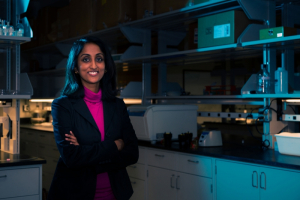When Dhivya Ketharnath was in high school, she knew she wanted to be an engineer, but she never would have predicted she would be conducting nanoparticle research for cancer therapy applications inside some of the finest biomedical laboratory facilities the city of Houston’s medical center has to offer.
Now, thanks to a grant from The Texas Center for Superconductivity at the University of Houston (TcSUH), along with UH’s College of Natural Sciences and Mathematics and the Cullen College of Engineering, Dhivya will continue pursuing her Ph.D. in electrical engineering with a $2,500 stipend to continue her research within the TcSUH laboratories.
The Houston Electrical League Scholarship is awarded each year to two outstanding undergraduate or graduate students with fantastic accomplishments both in academics and research. The merit-based scholarship is given to students currently conducting research within TcSUH’s multidisciplinary laboratories. The mission of these scholarships is to encourage interdisciplinary research with a focus on finding applications in biomedical sciences and engineering.
Under the guidance of faculty advisor Jarek Wosik, a research professor with the Cullen College’s Department of Electrical and Computer Engineering and TcSUH, Dhivya is conducting research on manipulating nanoparticles using radio frequencies and ac magnetic fields for cancer therapy applications. Through the HEL scholarship and TcSUH, Dhivya enjoys unique access to the Houston Methodist Research Institute (HMRI), where she conducts in-vitro cell studies at their laboratory facilities. In addition, Dhivya said HMRI doctors provide her with mentorship and guidance with her research.
Having access to HMRI facilities and researchers, Dhivya said, is invaluable in terms of understanding how the engineering side of her research translates to the biomedical world.
“It was very helpful to my research to have access to both [the TcSUH and the HMRI] laboratories,” Dhivya explained. “At TcSUH, I research how to engineer nanoparticles, but I can’t fully research how this work translates into cancer therapy in living cells without access to the biomedical laboratories at HMRI.”
At the Cullen College in general and the TcSUH in particular, a high premium is placed on providing funding for students and faculty members who take on ambitious, multidisciplinary research efforts. By investing in research and students such as Dhivya, the center has established award-winning research programs in medical imaging and nanomedicine and created lasting partnerships with a variety of collaborators at the Texas Medical Center.
For more information on TcSUH scholarships, please visit: https://www.tcsuh.com/outreach/.
